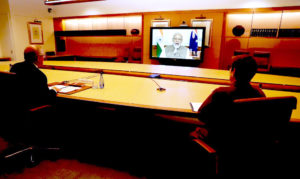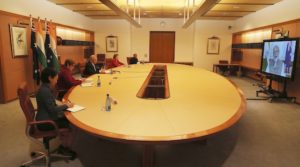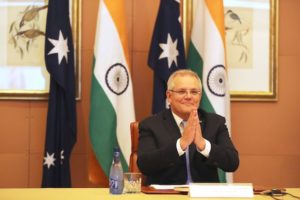Australia-India sign strategic partnerships

Prime Minister Scott Morrison held a virtual summit with Indian Prime Minister Narendra Modi at Parliament House in Canberra on Thursday, June 4, 2020.
Can India take up the challenge western nations are entrusting in its lap to counter unabated Chinese influence in the world. As China now extends its area of influence in the Indian neighbourhood: Pakistan, Sri Lanka, Nepal, even Bangladesh, with finance and infrastructure deals, it causes concern not only to India but to the whole world following China’s South-China Sea blatant occupation.

India welcomed the recent initiative on June 4 by Australian Government to hold virtual conferences by respective ministers including the prime ministers of the two nations, Scott Morrison and Narendra Modi, and signed agreements for greater co-operation in the Indo-Pacific region.

Defence
As part of the Australia-India Comprehensive Strategic Partnership announced by Prime Minister Scott Morrison and Indian Prime Minister Narendra Modi, two landmark Defence Arrangements between Australia and India have been established.
The Australia-India Mutual Logistics Support Arrangement and the Defence Science and Technology Implementing Arrangement provide a framework to deepen defence co-operation between the two countries.
Minister for Defence, Linda Reynolds, said India is a significant security partner for Australia.
“We have a strong shared interest in working together to support a stable and prosperous Indo-Pacific,” Minister Reynolds said.
The Mutual Logistics Support Arrangement will enhance military interoperability, enabling increasingly complex military engagement, and greater combined responsiveness to regional humanitarian disasters.
This arrangement paves the way for greater cross-service military activity, building on the success of the most complex exercise to date, AUSINDEX 2019, which focused on anti-submarine warfare.
The Science and Technology Implementing Arrangement will facilitate improved collaboration between our defence science and technology research organisations, both of whom have made important contributions in response to the COVID-19 pandemic.
“We now have a solid framework for Indian and Australian defence organisations to enhance our research collaboration and develop defence capabilities that help maintain our technological edge in this era of rapid change and increasing threats,” Minister Reynolds said.
Research Collaboration
In another agreement, AUSTRALIA and INDIA committed to research collaborations with nearly $20 million boost with funding for new projects to advance pandemic research and reduce plastics waste.
$15 million will go to extending the Australia-India Strategic Research Fund for another four years, while an additional $4.5 million will support collaborative work led by CSIRO to reduce plastic wastes.
Minister for Industry, Science and Technology, Karen Andrews, has welcomed the commitment following the virtual summit between the Prime Ministers of Australia and India.
“Science and technology and the innovations that result have never been more important for our wellbeing and prosperity,” Minister Andrews said.
“India is a natural strategic partner for Australia, and strengthening that relationship through a shared commitment to science and technology will only serve to benefit both our nations.”
Minister Andrews also announced the opening of a special grants round under the Australia-India Strategic Research Fund for joint projects responding to the COVID- 19 pandemic.
“These grants will bring together leading research institutions and industry in both Australia and India who are working on solutions such as vaccines, therapeutics, and diagnostics,” Minister Andrews said.
Individual grants of $300,000”“$600,000 will be available for Australian research organisations to undertake collaborative research projects over 12-18 months. The Indian Government will contribute a comparable amount to support the Indian partners on a matching effort basis.
The Morrison Government also entered into a landmark, cooperative arrangement with India on cyber affairs and critical technology.
Critical Technologies Co-operation
As part of the Australia-India Leaders’ Virtual Summit, Australian Foreign Affairs Minister Marise Payne and Indian External Affairs Minister, S. Jaishankar, signed the Australia-India Framework Arrangement on Cyber and Cyber-Enabled Critical Technologies Cooperation.
The Arrangement will enhance bilateral cooperation on cyber and critical technology issues, which sit at the core of the new Comprehensive Strategic Partnership with India. Under the Arrangement, Australia and India will work together to promote and preserve an open, free, safe and secure Internet, enhance digital trade, harness critical technology opportunities and address cyber security challenges.
Critical technologies such as artificial intelligence, quantum computing and robotics present significant opportunities for people, businesses and the broader economy, but also must be guided by international standards to ensure they do not present risks to security or prosperity.
That is why the Arrangement will be complemented by a new, four-year $12.7 million Australia-India Cyber and Critical Technology Partnership. This Partnership will create a research and development fund for Indian and Australian businesses and researchers, and support other countries to improve their cyber resilience. Together, these measures will help shape a global technology environment that meets our shared vision of an open, free, rules- based Indo-Pacific region.
Critical technologies such as artificial intelligence, quantum computing and robotics present significant opportunities for people, businesses and the broader economy, but also must be guided by international standards to ensure they do not present risks to security or prosperity.
That is why the Arrangement will be complemented by a new, four-year $12.7 million Australia-India Cyber and Critical Technology Partnership. This Partnership will create a research and development fund for Indian and Australian businesses and researchers, and support other countries to improve their cyber resilience. Together, these measures will help shape a global technology environment that meets our shared vision of an open, free, rules- based Indo-Pacific region.
Australia also signed a wide-ranging maritime declaration with India, marking a major step forward in the security and defence relationship as part of the Comprehensive Strategic Partnership between the two countries.
The Joint Declaration on Maritime Cooperation in the Indo-Pacific commits India and Australia to support the rules-based maritime order in the region, founded on respect for the sovereignty of all nations and international law, particularly the UN Convention on the Law of the Sea (UNCLOS).
Importantly, the partnership extends to working together to strengthen maritime domain awareness throughout the Indo-Pacific, and combating transnational challenges such as people smuggling, arms and narcotics trafficking, climate change, terrorism, and illegal, unregulated and unreported fishing.
The Declaration also seeks to step up cooperation and capacity-building in regional and multilateral forums, including through Australian support for Prime Minister Modi’s Indo-Pacific Oceans Initiative.
Expanded Australia-India cooperation on maritime safety and security will be marked in particular by building stronger links between coastguard and civil maritime agencies, and by developing deeper navy-to-navy engagement.
Short URL: https://indiandownunder.com.au/?p=15222
